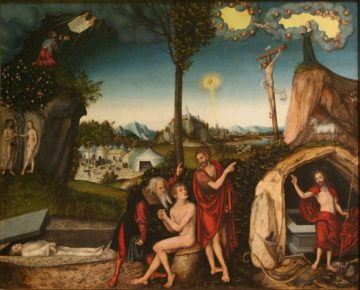Rev. William Alberts in counterpunch:
 Christianity has built-in contradictions. Certain Christians seek to empower people, while other Christians seek to gain power over them. Some Christians want to comfort people, while other Christians want to convert them. There are Christians who seek to love their neighbors as themselves, and other Christians want to make their neighbors like themselves. Certain Christians believe that people know what is best for themselves, while other Christians believe that they know exactly who and what is best for everyone. For some Christians, faith is about social justice and ethical behavior for other Christians, it is about theological orthodoxy. Certain Christians are committed to creating justice for people in this life, while other Christians stress justification by faith in Jesus Christ alone as the key to salvation in a future life. Not that evangelizing-motivated Christians do not comfort or empower or want justice for people, but they want it on their “Jesus is the Savior of the world” terms. Their unconscious predatory paternalism prevents them from experiencing and honoring other people’s reality and beliefs and negates any real mutually respectful democratic give and take.
Christianity has built-in contradictions. Certain Christians seek to empower people, while other Christians seek to gain power over them. Some Christians want to comfort people, while other Christians want to convert them. There are Christians who seek to love their neighbors as themselves, and other Christians want to make their neighbors like themselves. Certain Christians believe that people know what is best for themselves, while other Christians believe that they know exactly who and what is best for everyone. For some Christians, faith is about social justice and ethical behavior for other Christians, it is about theological orthodoxy. Certain Christians are committed to creating justice for people in this life, while other Christians stress justification by faith in Jesus Christ alone as the key to salvation in a future life. Not that evangelizing-motivated Christians do not comfort or empower or want justice for people, but they want it on their “Jesus is the Savior of the world” terms. Their unconscious predatory paternalism prevents them from experiencing and honoring other people’s reality and beliefs and negates any real mutually respectful democratic give and take.
Christianity’s built-in contradictions are found in its scripture. In Luke’s gospel, Jesus is recorded as saying that his mission was one of empathy: “the Spirit of the Lord is upon me because he has anointed me to “proclaim good news to the poor . . . liberty to the captives and recovering of sight to the blind, and to set at liberty those who are oppressed.” (4: 18,19) But the liberator was transformed into an evangelizer. In Matthew’s gospel, an assumed resurrected Jesus commissioned his disciples with, “All authority in heaven and on earth is given to me. Therefore go and make disciples of all nations, baptizing them in the name of the Father and of the Son and of the Holy Spirit, teaching them to obey everything that I have commanded you..” (28: 16-20) From identification with people to domination over people.
These contradictory biblical narratives are explained by a leap of three centuries after Jesus death.
More here.
